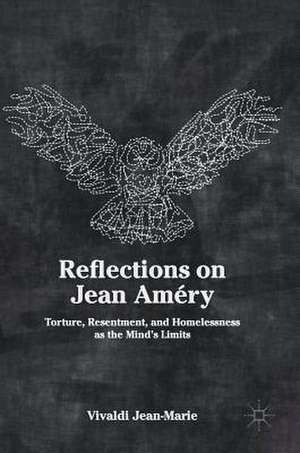Reflections on Jean Améry: Torture, Resentment, and Homelessness as the Mind’s Limits
Autor Vivaldi Jean-Marieen Limba Engleză Hardback – 6 dec 2018
| Toate formatele și edițiile | Preț | Express |
|---|---|---|
| Paperback (1) | 378.92 lei 6-8 săpt. | |
| Springer – 19 dec 2019 | 378.92 lei 6-8 săpt. | |
| Hardback (1) | 468.44 lei 6-8 săpt. | |
| Springer International Publishing – 6 dec 2018 | 468.44 lei 6-8 săpt. |
Preț: 468.44 lei
Preț vechi: 551.10 lei
-15% Nou
Puncte Express: 703
Preț estimativ în valută:
89.64€ • 93.78$ • 74.46£
89.64€ • 93.78$ • 74.46£
Carte tipărită la comandă
Livrare economică 02-16 aprilie
Preluare comenzi: 021 569.72.76
Specificații
ISBN-13: 9783030023447
ISBN-10: 3030023443
Pagini: 133
Ilustrații: XI, 147 p.
Dimensiuni: 148 x 210 mm
Greutate: 0.35 kg
Ediția:1st ed. 2018
Editura: Springer International Publishing
Colecția Palgrave Macmillan
Locul publicării:Cham, Switzerland
ISBN-10: 3030023443
Pagini: 133
Ilustrații: XI, 147 p.
Dimensiuni: 148 x 210 mm
Greutate: 0.35 kg
Ediția:1st ed. 2018
Editura: Springer International Publishing
Colecția Palgrave Macmillan
Locul publicării:Cham, Switzerland
Cuprins
1. Memory, the Jewish Intellectual, and Cartesian Cogito.- 2. Torture and Homelessness: The Horrible Can Make No Claim to Singularity.- 3. Améry and Nietzsche on Resentment, Collective Guilt, and Historical Revisionism.- 4. Améry and Sartre: The Necessity and Impossibility of Being an Authentic Jew.- 5. Conclusion.
Notă biografică
Vivaldi Jean-Marie is a Professor of Philosophy at the City University of New York. He also holds an ongoing appointment as an adjunct Professor of Philosophy and African-American Studies at the IRAAS at Columbia University. He is the author of Fanon: Collective Ethics and Humanism (2007), Kierkegaard: History and Eternal Happiness (2008), and Voodoo Cosmology and the Haitian Revolution in the Enlightenment Ideals of Kant and Hegel (2018). He has published articles in the following peer-reviewed journals: Gnosis, The Western Journal of Black Studies, Souls, and The CLR James Journal. He was Scholar-in-Residence at Hertford College, Oxford University during the Summer 2015.
Textul de pe ultima copertă
This book elaborates Jean Améry’s critique of philosophy and his discussion of some central philosophical themes in At the Mind’s Limits and his other writings. It shows how Améry elaborates the shortcomings and unfitness of philosophical theories to account for torture, the experience of homelessness, and other indignities, and their inability to assist with overcoming resentment. It thus teases out the philosophical import of Jean Améry's critique of philosophy, which constitutes his own philosophical testament of being an inmate at Auschwitz. This book situates At the Mind’s Limits in the context of twentieth-century Continental philosophy. On the one hand, it elaborates Améry’s engagement with key philosophical figures. On the other hand, it shows how thoroughly Améry denounces the limits of the philosophical enterprise, and its impotence in capturing and accounting for the crimes of the Third Reich.
Caracteristici
Explores Jean Améry’s critique of philosophy, as well as some central philosophical themes in his writings Argues that At the Mind’s Limits offers a unique perspective onto the Holocaust and its cultural and ethical aftermaths Situates selected parts of At the Mind’s Limits in a conversation with those European philosophers and traditions that influenced Améry
